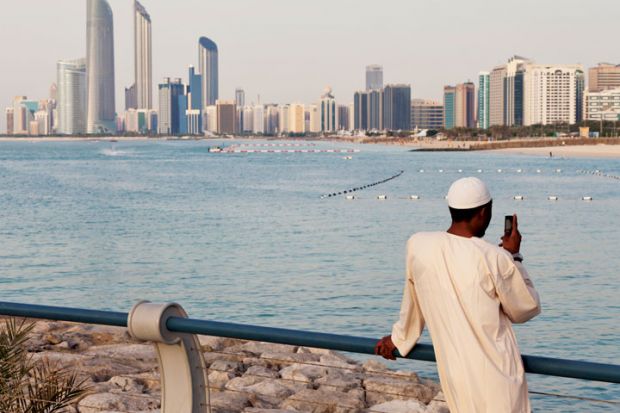New York University’s highly selective Abu Dhabi campus has shown that it is possible for a degree-granting overseas branch to match the home campus’ quality, while “agreement and understanding” to safeguard academic freedom has been “maintained”, according to its vice-chancellor.
Mariët Westermann, the Dutch art historian who has returned to NYU Abu Dhabi after serving as its founding provost, also discussed the role the campus plays in economic ambitions in the emirate, where there is state funding for the venture.
The campus was founded in 2008 before opening to degree students in 2010 as part of NYU’s plan to create a “global network university”, now spread across three degree-granting “portal campuses” – New York, Abu Dhabi and Shanghai – along with 12 smaller academic centres around the world.
NYU Abu Dhabi, which bills itself as a “comprehensive liberal arts and science” institution, was thus the “first component” in an idea that is “still controversial in higher education”, said Professor Westermann, who returned to the campus in August 2019 after nine years at the Andrew W. Mellon Foundation. “Really traditional universities do not like to grant a degree even one mile off their campus.”
From the start, the ambition has been to ensure that quality at the Abu Dhabi site is the same as, “or better” than, that at the New York campus, Professor Westermann said. “What the NYU Abu Dhabi experiment…has [achieved] is really shown that can be done.”
Across NYU, “our student body has improved thanks to NYU Abu Dhabi”, she said. “I don’t love measuring quality by how many people you send away,” Professor Westermann added, before observing that the campus has “became so popular that our admit rate is 4 per cent – we had more than 14,000 applicants last year for 450 places”.
“People start paying attention to this,” she said, adding that the campus also showed “that we were really serious about international and intercultural education”, which has helped to drive NYU’s international recruitment.
Over the next five to seven years, NYU Abu Dhabi is planning for “significant growth”, said Professor Westermann, with the goal of increasing undergraduate numbers from 1,450 to 2,200 and postgraduate numbers from 80 to 400.
NYU Abu Dhabi has been described as “fully funded” by the United Arab Emirates government. What does the state gain from the campus, where just 15 per cent of undergraduates are from the UAE?
“The vision of the leadership of Abu Dhabi was, ‘how can we work with the university to attract talent that wants to stay?’” Professor Westermann said.
Forty per cent of NYU Abu Dhabi’s most recent graduating class have stayed in the UAE, she continued. The nation “does not have a huge local indigenous population”, but the government is “ambitious in terms of creating a post-hydrocarbon economy”, she added.
“They need talent to help lead institutions, help develop institutions like the Cleveland Clinic [luxury hospital] that’s there now, or world-class museums, the banking sector, the consulting sector, the non-profit sector. Our students really gravitate to this.”
The campus is on Saadiyat Island, the site of a tourism and culture district that includes the Louvre Abu Dhabi, with a Guggenheim Abu Dhabi also planned.
Asked about how the campus’ financial model operates, Professor Westermann described it as a “genuine partnership”. The state “partners” have “made available this incredible campus”, and they “help us, of course, with all sorts of costs related to faculty and students”, she added.
“But our resource base is more diverse than people would think. We have done a good job garnering research resources, for example.”
In 2015, an NYU academic was barred from entering the UAE by the government after criticising the exploitation of workers who built the Saadiyat Island campus. In 2018, Durham University PhD student Matthew Hedges was arrested by the UAE on charges of spying and was held for six months before being released.
Is there a challenge for NYU Abu Dhabi on maintaining academic freedom?
“From the beginning, it was our understanding – and my understanding if I was going to be the provost there – that we were going to have to have freedom of academic enquiry and teaching the way we do in New York and our other NYU sites,” said Professor Westermann. “That agreement and understanding is very fundamental – and has been actually maintained, as any person on the campus will tell you.”
Have any NYU academics been reluctant to teach at the campus because of scholarly freedom concerns?
Professor Westermann said: “I have so far not encountered people at NYU saying to me, ‘I won’t come there.’ But I haven’t asked the question outright.”
john.morgan@timeshighereducation.com
The Times Higher Education MENA Universities Summit 2020 will be held at NYU Abu Dhabi 10-12 March, 2020. Find out more.
Register to continue
Why register?
- Registration is free and only takes a moment
- Once registered, you can read 3 articles a month
- Sign up for our newsletter
Subscribe
Or subscribe for unlimited access to:
- Unlimited access to news, views, insights & reviews
- Digital editions
- Digital access to THE’s university and college rankings analysis
Already registered or a current subscriber? Login








